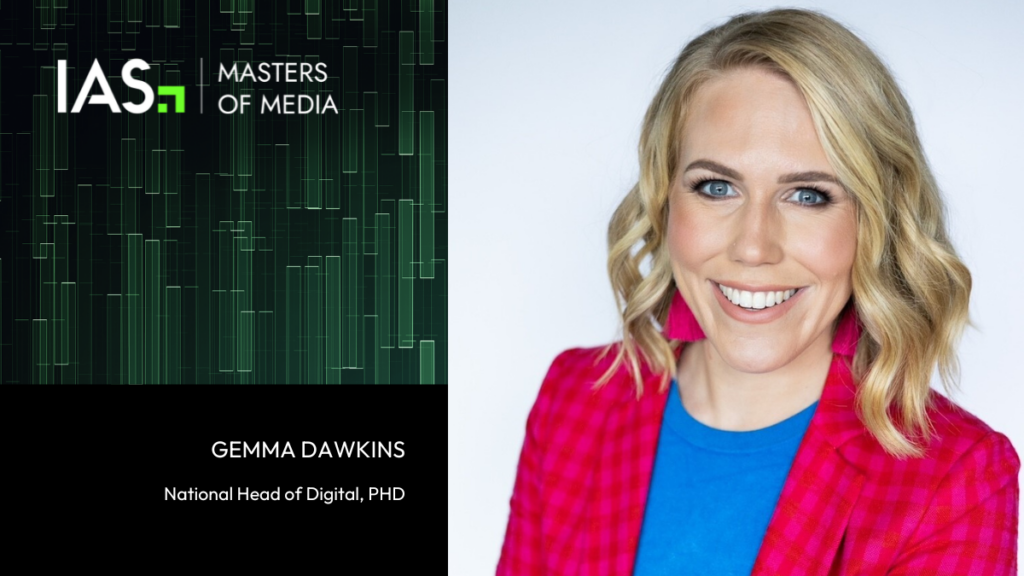
In this exclusive “Masters of Media” series, Integral Ad Science (IAS) speaks to the Movers and Shakers of the APAC advertising industry on all digital matters.
Gemma leads the PHD agency agenda and capabilities in the areas of technology, digital and data at a national level. Her experience in these fields spans EMEA and Australia, having worked overseas and in international roles. She is actively involved in broader industry initiatives through her work with the MFA, IAB and AANA, with a mission to build the effectiveness of advertising and safeguard the interests of our clients.
Gemma’s particular area of passion is in media responsibility, ranging from brand safety to ethics. She recently completed a Data and Privacy Law certification from the London School of Economics and is ready for the next wave of online regulation.
IAS: Can you share your career journey in the digital media industry, highlighting key milestones and experiences that have shaped your professional path?
Gemma: I’ve had a few knockbacks in my career; in fact, it took me a year and multiple attempts to get onto a graduate scheme. Each time I got that rejection it really stung, but I got a job in marketing for a year and kept trying until eventually I got the acceptance email. This experience made me want a career in media even more. I became more confident that this was the job for me with each presentation I had to give on “a media campaign that had impressed me.” I think knowing how hard I had to work to get here in the first place humbled me and has made me grateful that I get to work in this industry every day.
Eventually, I started my career in London as a planner. When a client win necessitated an agency restructure, I was moved into the digital team. I still remember the day I was informed; I was devastated and insisted I could not be in the digital team because I didn’t know anything about technology. “I don’t even own a smartphone,” I cried to my manager. But it worked out ok in the end!
I moved to Australia almost 8 years ago, and being in a smaller market meant I was exposed to a whole new facet of my role and was hands-on across all digital touchpoints. I went from planning the brand digital display for a client (there were about 15 of us in the digital team for this particular client) to being the only digital person across several clients.
I’ve had some great experiences along the way – I was on the first-ever Squared program in the UK, I volunteered with the Prince’s Trust to help disadvantaged teenagers get marketing internships, I joined the MFA Interactive Committee and was part of the Digital Foundations Certification creation. I’ve even won a couple of industry awards.
I rarely make a conscious decision to shape my career path, but I’ve always put my hand up for every opportunity that comes my way. As a result, this has sometimes benefitted me professionally but always benefited me personally (I’m not even sure where I made friends before I was in media!).
IAS: What are some challenges Australian marketers face regarding digital advertising?
Gemma: The complexity facing marketers is getting harder to navigate, not easier. And, advertising is just one component of the role of a marketer, so lumping in privacy regulations, cookie deprecation, attribution challenges, eCommerce growth and the monthly brand safety press exposé can make digital seem overwhelming.
Whilst the landscape has become more complex, we’ve seen a reduction in the diversification of investment and many brands have consolidated spend into a few key platforms. Initially, it might seem that fewer platforms mean compliance is easier. There is less creative hassle and managing frequency across your audience is possible, but this consolidation brings a host of new challenges. Now brands face a reliance on platforms and are at the mercy of constant changes to advertising services. Each time an automated ad product is released, we move further into the ‘black box’ of algorithms and further away from control over how and where our ad dollars are spent.
As marketers, we must stay informed of changes, ensure we are consistently evaluating their effectiveness and can demonstrate how our marketing efforts are driving business outcomes. It has never been more challenging to do this.
IAS: If there’s one myth related to programmatic you’d like squashed, what would that be?
Gemma: That programmatic inventory is not quality inventory. I think that we still hold a legacy view of programmatic activity being placed on long-tail sites, below the fold and with ad stacking. At PHD, over 80% of our programmatic investment is on premium inventory secured through PMP or PG deals. Anything that runs open exchange is done on an inclusion list, with an SPO strategy in place and third-party verification to measure and mitigate low viewability and ad fraud. With planning principles and buying rigour in place, programmatic activity is absolutely quality inventory.
IAS: In a rapidly changing industry like digital media, how do you and your agency stay at the forefront of innovation and adapt to new technologies and trends?
Gemma: We are exceptionally lucky at PHD to be supported by the diverse services at OMG, and a lot of our learning comes from working alongside these specialists. For example, last year we appointed a Head of Cleanroom Development and having this capability in-house has allowed our team to expand their knowledge as adoption of cleanroom solutions accelerates.
I’d caution against investing too much time in trends. We’re in the business of helping our clients grow their brands and rarely will investing heavily in a trend lead to long-term brand growth.
IAS: In your opinion, is the industry doing enough to combat the trust and transparency challenges in the digital supply chain?
Gemma: In 2018, the MFA, IAB and AANA released the ‘Australian Digital Advertising Principles’ to build trust, instil confidence, and foster shared responsibility for the digital advertising value chain. As a member of this task force, I am hugely proud to see Australia leading the way in transparency conversations, with lean-in from across our industry.
In fact, one of the things that attracted me to OMG is that they have been incredibly vocal in this space, with transparency agreements signed with over 300 partners. However, this isn’t just the role of an agency. Clients need to lean into this conversation, using the checklists provided in the ADAP document, to ensure that they are comfortable with where their media dollars are being invested and the outcomes being driven for them.
IAS: Any advice for leaders on talent retention and supporting a hybrid workforce?
Gemma: The dynamic between employer and employee has been in a constant shift since 2020. I think where we have settled is that a ‘one size fits all’ approach is no longer relevant for today’s workforce. People want a personalised experience at work and want an employer to meet different needs at different life stages. This can be incredibly complex to deliver at scale, so we have to balance the needs of individual teams with the greater agency good.
My focus is not necessarily on retention in our digital team; instead, we are focused on developing talent to ensure that our people always feel that they are learning, motivated and have a voice, regardless of experience or tenure. This is achieved through a program that encourages critical thinking, empowers people to share opinions and inspires us outside of the day-to-day. Our program consists of monthly digital debates, national huddle sessions, mentoring opportunities and our ‘Sparkle Series’ that gets us out of the office quarterly. We hope that by dedicating time and effort to creating a personalised learning agenda for our people, they feel supported in their development. This is all I could hope for our next generation of leaders.
IAS: What’s your favourite book/podcast/movie and why?
Gemma: I’m a big reader (and a recent library convert – free books, how good!) Nothing has made me cry and given me the feels like A Little Life by Hanya Yanagihara. It ruined all other books for me for about a year afterwards.
IAS: What is your advice to the fresh talent in the industry?
Gemma: My advice to the fresh talent in the industry is to be adaptable. The only constant in this industry is change, so embrace every opportunity that comes your way as you never know what doors it may open for you.
 Share on LinkedIn
Share on LinkedIn Share on X
Share on X

